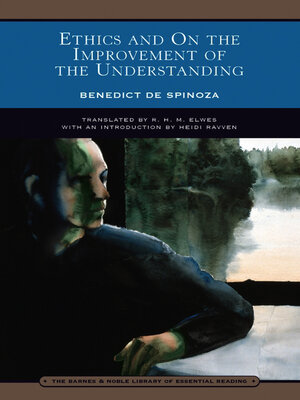Ethics and On the Improvement of the Understanding (Barnes & Noble Library of Essential Reading)
ebook ∣ Barnes & Noble Library of Essential Reading
By Benedict de Spinoza

Sign up to save your library
With an OverDrive account, you can save your favorite libraries for at-a-glance information about availability. Find out more about OverDrive accounts.
Find this title in Libby, the library reading app by OverDrive.



Search for a digital library with this title
Title found at these libraries:
| Library Name | Distance |
|---|---|
| Loading... |
Baruch Spinoza places freedom as the ultimate aim and central value of the life well lived. His philosophy is marked by the most thorough going naturalism of any of its period, so much so that a number of its central tenets remain a matter of lively debate today.
Spinozas commitment to the search for a comprehensive understanding of all things inspired Einstein. Furthermore, discoveries in the neurosciences in the early twenty-first century provide evidence that Spinozas biological understanding of the emotions may also have been essentially on target. It was upon this prescient naturalistic scientific foundation that Spinoza developed a new approach to ethics. Perhaps the most important heirs to Spinozas thought are Nietzsche, Marx, and Freud, but the Radical Enlightenment has recently been laid largely at his feet.
Nevertheless, Spinozas last words in the Ethics sound a note of caution and perhaps even of warning: "All things excellent are as difficult as they are rare." Time, however, is finally catching up with Spinoza and the journey through his philosophy is well worth the effort, as his views now more than ever capture the contemporary scientific imagination and ethical sensibility.
Spinozas commitment to the search for a comprehensive understanding of all things inspired Einstein. Furthermore, discoveries in the neurosciences in the early twenty-first century provide evidence that Spinozas biological understanding of the emotions may also have been essentially on target. It was upon this prescient naturalistic scientific foundation that Spinoza developed a new approach to ethics. Perhaps the most important heirs to Spinozas thought are Nietzsche, Marx, and Freud, but the Radical Enlightenment has recently been laid largely at his feet.
Nevertheless, Spinozas last words in the Ethics sound a note of caution and perhaps even of warning: "All things excellent are as difficult as they are rare." Time, however, is finally catching up with Spinoza and the journey through his philosophy is well worth the effort, as his views now more than ever capture the contemporary scientific imagination and ethical sensibility.







